Welcome to the February 2013 issue of the Global Washington newsletter. If you would like to contact us directly, please email us.
IN THIS ISSUE
- Note from our Executive Director
- Featured Organization: A Right to Assistance in Times of Emergency: Save the Children’s Disaster Relief Programming and the Ongoing Importance of Collective Action
- Changemaker: Theresa Schulz Norris: Women and water tanks turn potential into opportunity
- Welcome New Members
- GlobalWA Announcements
- Announcements
- Career Center
- Upcoming Events
Note from our Executive Director
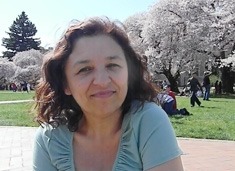
Greetings and happy February!
On Valentine’s Day, many of us celebrated and showed appreciation for our loved ones. At Global Washington, we encouraged our supporters to show some love to organizations that they care about—particularly those doing meaningful work to improve the lives of women and girls around the world.
We’ll be continuing this theme into the month of March, which is women’s history month with March 9th as International Women’s Day. Global Washington’s members know that development work that benefits girls, in turn, benefits entire families and communities. We hope you will celebrate and support this work in the month of March!
You may have noticed that Global Washington is hiring for several new positions and we are excited to grow and increase our impact in the upcoming months. We are happy to introduce our newest staff member Becky Anderson, who is taking over for Megan Boucher as Global Washington’s Office Manager. Those of you who are actively involved will certainly be hearing from Becky as she will be supporting our membership, events, and general office functions. Take a moment to welcome her next time you are in the office!
In unity,
![]()
Bookda Gheisar, Executive Director
A Right to Assistance in Times of Emergency:
Save the Children’s Disaster Relief Programming and the Ongoing Importance of Collective Action
By Anna Jensen-Clem
“Everyone has a right to life and a right to assistance” in the event of a disaster. Robert Laprade, Associate Vice President for Humanitarian Response at Save the Children, articulated this late in our conversation, but it is a consistent thread running through Save the Children’s programs across the globe.
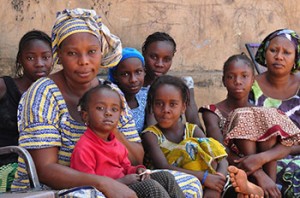 Emergency and humanitarian relief programs play a key role in international development; they provide immediate relief from natural disasters, help to stabilize disaster-prone communities, and build resilience to the long-term effects of a humanitarian emergency. Washington, D.C.-based Save the Children runs country- and region-specific programs in about 100 developing countries and operates across all three spheres. This network, aided by regional and worldwide offices, acts as a frontline defense against the immediate effects of a disaster, and serves as a conduit through which supplies, support, and aid can be transferred to the affected area most efficiently.
Emergency and humanitarian relief programs play a key role in international development; they provide immediate relief from natural disasters, help to stabilize disaster-prone communities, and build resilience to the long-term effects of a humanitarian emergency. Washington, D.C.-based Save the Children runs country- and region-specific programs in about 100 developing countries and operates across all three spheres. This network, aided by regional and worldwide offices, acts as a frontline defense against the immediate effects of a disaster, and serves as a conduit through which supplies, support, and aid can be transferred to the affected area most efficiently.
In addition to providing services and aid in instances of flood, drought, earthquake, and other natural disasters, Save the Children also hosts public health workshops, educational programs, and agricultural trainings to mitigate the devastating effects of a longer-term disaster. Save the Children’s programs draw their strength from this mix of local and international resources; by employing aid workers from the host countries, the organization has a built-in understanding of the local language and customs. Coupled with the financial backing of the larger international network, Laprade says, Save the Children’s emergency relief programs can provide rapid, country-specific response across a broad spectrum of issues.
Children are the primary targets of these programs, but of course, ensuring children’s security also means making sure their families have food, potable water, quality medical care, and the resources to send children to school. Access to education is one of Save the Children’s primary foci, and this extends to training teachers and using an “acceptance approach” in working with community leaders to protect schools and students even in the event of a security crisis.
In northern Mali, for example, Save the Children’s Gao office was ransacked, as were the offices of many other organizations in the area. However, staff returned to their work and tried to maintain basic security for themselves and for the children they served. Clearly, staff in a conflict zone cannot do their jobs if they themselves aren’t safe, so security procedures are updated on a regular basis. Laprade emphasized throughout our conversation that the organization as a whole is politically neutral and in situations of armed conflict, it works with community members to serve its mission despite ongoing political impediments.
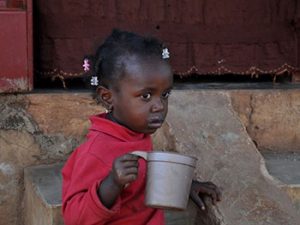 Independence is another key focus of Save the Children’s programming; Laprade noted that the organization exercises extreme caution in allocating funding, especially in “highly charged political environments” where U.S. government funding might be unwelcome. Essentially, by maintaining political neutrality, the organization can provide relief programs to all victims of an emergency or disaster rather than being limited to the allies of one particular party or faction. By forging local ties and providing jobs in the community, Save the Children builds alliances in communities that supersede political alliances or disputes. As discussed in the example above, the organization works with local leaders throughout northern Mali to make sure children can still attend school (either in school buildings or at home), and Laprade noted that in some cases, local leaders have come together to make sure program staff can continue their work despite the conflict.
Independence is another key focus of Save the Children’s programming; Laprade noted that the organization exercises extreme caution in allocating funding, especially in “highly charged political environments” where U.S. government funding might be unwelcome. Essentially, by maintaining political neutrality, the organization can provide relief programs to all victims of an emergency or disaster rather than being limited to the allies of one particular party or faction. By forging local ties and providing jobs in the community, Save the Children builds alliances in communities that supersede political alliances or disputes. As discussed in the example above, the organization works with local leaders throughout northern Mali to make sure children can still attend school (either in school buildings or at home), and Laprade noted that in some cases, local leaders have come together to make sure program staff can continue their work despite the conflict.
Save the Children works across a wide variety of issue areas, and focuses its international and domestic programs on the following sectors: nutrition and health; newborn and infant care; child protection (identifying children in emergencies and helping with reunification); prevention of child soldier recruitment and assisting in reintegration; anti-trafficking; ending gender-based violence; and providing access to education in emergencies. Save the Children and UNICEF partner to coordinate global educational practices in times of conflict and emergency, as in northern Mali.
Since Global Washington is focusing its work this year around collective impact (it was the main topic of discussion in last December’s annual conference and GlobalWA is hosting a series of working groups throughout 2013 to find new ways to strengthen our collective impact), Save the Children’s emergency response programs are a natural fit. As we know, many of Global Washington’s members work across a wide variety of regions and issue areas, but natural disasters, famine, drought, and food insecurities intervene. It stands to reason, then, that Global Washington members would be interested in learning more about and perhaps fostering relationships with Save the Children’s program officers throughout the developing and developed world. As we learned during the conference, our impact is far greater if we work together toward the same goals.
Changemaker
Theresa Schulz Norris: Women and water tanks turn potential into opportunity
By Megan Boucher
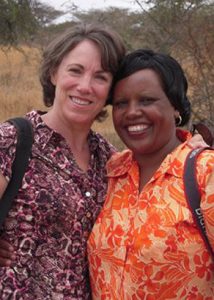
Theresa and Gracie
Theresa Schulz Norris spent two memorable weeks in Namibia laying bricks side by side with a Kenyan woman named Gracie. The two became close friends and later partnered in founding Women’s Enterprises International (WEI). Theresa laughs about the fact that she and Gracie were the best brick layers in the group. In fact, WEI’s success is built around the accomplishments that women can achieve when they work together—an idea that Theresa and Gracie modeled even before the organization was founded.
Theresa ‘s personal mission statement is to see “people, women and girls especially, recognize their gifting and capacity and begin to live into their God-given potential.” She also wants to see people “discover a passion for giving, for service, and for touching the life of someone else in a positive way.” This twofold mission also permeates the culture of Women’s Enterprises International.
Theresa began her career in the perhaps unlikely field of technology, working for 16 years as a developer and product manager. “My longest employment was with Microsoft,” she recalls, “and it was my experience at Microsoft that opened the door for my first opportunity to work overseas.” Through her church, Theresa learned of an organization in India seeking someone experienced with the Microsoft Office Suite of products to set up their computer system and train their staff on its use. “The opportunity had my name written all over it,” she says of her decision to spend two and a half months in Agra, India. During her time there, she traveled to the countryside and was exposed for the first time to the extreme poverty, disparity, and lack of opportunity faced by the people of rural India–especially the girls.
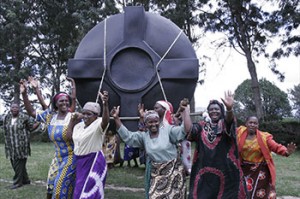
Women with a water tank
Born into a family of educators, Theresa grew up believing strongly in the value of education. In rural India, she was particularly struck by the fact that where people were born, who they were born to, and their gender determined their opportunities: “There I was, meeting young girls and women for whom going to school was not a given as it was for me. It wasn’t even a possibility.” The experience made her appreciate her own opportunities and feel a responsibility to find a way to create opportunity for others.
She returned from India convinced that she wanted to do international development work. “At that time, if you weren’t a nurse, teacher, or doctor, there were very few options, and I was a business person!” Theresa believed that there had to be a way for people like her to contribute their skills to global problems, but for a long time no opportunities presented themselves. Instead, a friend convinced Theresa to join his startup medical technology business. She spent two enjoyable years getting the company off the ground, but at the same time wondered why she was still working in high tech instead of doing development work. However, looking back she calls the opportunity “God’s arrangement” to give her much-needed entrepreneurial experience. “I’m thankful for that time. Everything I learned in those two years was directly applicable to the starting of Women’s Enterprises.”
During those years, she networked with NGOs, participated on a number of short-term mission trips to the developing world, and gained exposure to the emerging field of microenterprise. In microenterprise and the empowerment it brings, she finally saw an area where business people could contribute to development work in a meaningful way.
It was on a trip to Kenya that Theresa saw an opportunity to bring together her passions for educating girls and empowering women through microenterprise. She discovered the secret to empowering girls lies in empowering their mothers, because, “if you empower a mother you help the entire family.” Surprisingly, in Kenya, one of the best ways to empower mothers is by equipping them to get clean water.
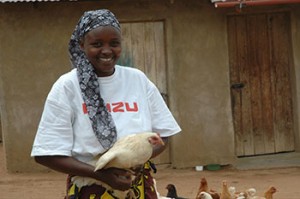
Earning income
That discovery changed Theresa’s life, and a visit to the Kyakalinga, the village where her friend Gracie grew up, offered a tangible opportunity to put that discovery into action. For the previous four years, Gracie, a skilled community development leader, had worked to help the women see that “they weren’t as poor as they thought they were. They had hands, they had feet, and they had skills that they could use to bring about positive change in their own lives,” says Theresa. Through a needs assessment the women identified rainwater harvesting as the best way to address their primary need for clean water. They were working to build giant cisterns at each woman’s home—37 in all. Theresa saw the first 7 tanks in action on the first day of the rain. “It was the most beautiful sound–the water running down the roof, through the pipes, and into the tank,” she recalls.
Theresa loved the project and especially the women’s hard work and ownership of it. She also saw that it would take an incredibly long time to reach their goal of 37 cisterns. She had the idea to provide matching grants for the project, a model that would continue to encourage initiative and ownership, but also reduce the risk, provide a powerful incentive, and help them receive their tanks more quickly. With the matching grants, Theresa also saw an opportunity to connect women in the U.S. with women in the villages and Gracie agreed.
When she came home, she was barely back in the U.S. for 24 hours when she secured $7,500 from the missions committee of her brother’s church for her new project. Soon after, a friend from University Presbyterian Church (UPC) in Seattle heard about the project and asked to get involved. “Within a week, I had funding, I had a partner to work with, and it just took off,” Theresa remembers. Today, WEI is working with over 2,000 women in 60 villages.
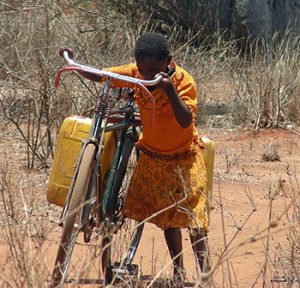
Girl fetching water
While water is an important aspect of WEI’s work, it is the group-based micro-savings, training, and matching grants that lay the foundation for long-term, ongoing change. “Water is the catalyst that brings the women together. It is the shared need that they work and sacrifice for,” says Theresa. Water is the catalyst for other important goals including creating economic opportunities for women. For instance, the women have to save enough money for one tank before they can receive a match from WEI, so many women start small businesses in order to meet these goals. And amazingly, water is the foundation for Theresa’s initial passion: girls’ education. When a family has clean water at home, daughters no longer have to search for water and can go to school.
Women’s empowerment and women working together is a crucial part of the WEI model. One woman’s story epitomizes the mission of WEI and Theresa’s personal goal of seeing women realize their gifts and potential. Agnes was part of WEI’s 7th women’s group. She lived the life of a typical village woman in Kenya, spending her time fetching water, caring for her children, and struggling to find school fees, but her life was transformed when she saw women in a neighboring community start a water project through WEI. Inspired, Agnes organized women in her village to start their own water project, of which Agnes was elected chairlady. Through this project, Agnes discovered her own leadership skills, increased her financial literacy, learned new skills as a speaker, and became a strong motivator and mentor. Women from nearby communities began looking to her to help them start their own water projects. She is now the regional coordinator for seven groups in the area and travels all over Kenya training new groups.
The women’s groups provide important support, friendship, and accountability. “They’re in a caring, supporting community where it is not only acceptable, but actually required to take a risk,” Theresa explains. “But they are supported in the process.” It is a testament to the strength of these support networks that, although some women receive their water tanks before the others in the group, Theresa is not aware of even one instance where a woman has left the group before everyone in the group has received a tank. The idea of a committed network of women extends to WEI itself, which is guided by Theresa and an all-female board and receives extensive support from a broad community of women in the U.S.
Theresa emphasizes that although WEI is focused on women, men are also important to achieving its mission and many men are some of WEI’s strongest supporters. Theresa was fully involved in WEI when she married her husband, who has become a partner in the work. Their honeymoon was spent in Tanzania, Kenya (visiting WEI groups), and Rwanda (where her husband had been involved in his own development projects). The couple even had a second wedding in Rwanda.
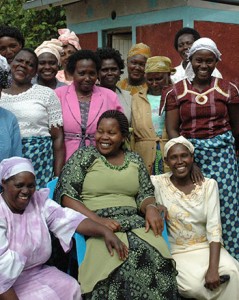
Agnes and her group members
A native Washingtonian herself, Theresa is enthusiastic about WEI’s location in the Pacific Northwest and participating in such strong globally-minded community. “These people and organizations are doing meaningful, significant global development work. It’s really unique to this area,” she says. She cites the opportunities for partnerships and shared learning as invaluable for continuing to do this work and commends Global Washington’s work in leveraging this community to create a greater impact by working together. “It’s just like the women’s groups we work with!” she laughs.
Theresa’s dream in 5 or 10 years is to rent a plane, fly over the communities where WEI works, and see the “black dots” of all the water tanks that represent transformed communities. She would also like to see WEI grow in both breadth and depth, expanding to more communities in Kenya and building on the foundation of water to address other crucial community needs such as food security and economic development. In the future, she looks to transfer the WEI model to new countries and regions. Another important component for Theresa is to see more connections between groups here locally and groups abroad, forming relationships and a stronger global community.
Theresa does not seem at all inclined to slow down in the pursuit of these goals. Her personal motivation to continue forward is based in her faith and desire to share God’s love that she has experienced with other people in a tangible way. “It’s about love and compassion,” Theresa explains. “I’m motivated by a belief that women (and men) are created in the image of God with abilities and gifts. There is a really beautiful inherent dignity in that.”
Welcome new members
Please welcome our newest Global Washington members. Take a moment to familiarize yourself with their work and consider opportunities for support and collaboration!
Seattle Pacific University
Seattle Pacific University seeks to be a premier Christian University fully committed to engaging the culture and changing the world by graduating people of competence and character, becoming people of wisdom, and modeling grace-filled community. www.spu.edu
Facing the Future
Facing the Future creates tools for educators that equip and motivate students to develop critical thinking skills, build global awareness and engage in positive solutions for a sustainable future. http://www.facingthefuture.org/
Global Washington Announcements
New Office Manager Becky Anderson
We are pleased to welcome Becky Anderson as the newest member of our staff. Becky started work at Global Washington in mid-February and we are excited for what she will bring to the organization. Say hello to her next time you are in the office or attending one of our events!
 As Global Washington’s Office Manager, Becky is responsible for program support, membership tracking, supervising interns and volunteers, and coordinating event logistics. While serving as a Health Education Facilitator in Moldova in the US Peace Corps, she learned first-hand of the importance of sustainable international development. Becky served as a volunteer ESL tutor in the University of Washington’s Language Exchange Program and is active in the Seattle Area Peace Corps Association (SEAPAX). She received her bachelor’s degree in Psychology from Valley Forge Christian College in Phoenixville, Pennsylvania. Becky is an enthusiastic explorer of Seattle’s culture of art and music and is especially fond of ballet, museums, hot yoga, and discovering new cuisines.
As Global Washington’s Office Manager, Becky is responsible for program support, membership tracking, supervising interns and volunteers, and coordinating event logistics. While serving as a Health Education Facilitator in Moldova in the US Peace Corps, she learned first-hand of the importance of sustainable international development. Becky served as a volunteer ESL tutor in the University of Washington’s Language Exchange Program and is active in the Seattle Area Peace Corps Association (SEAPAX). She received her bachelor’s degree in Psychology from Valley Forge Christian College in Phoenixville, Pennsylvania. Becky is an enthusiastic explorer of Seattle’s culture of art and music and is especially fond of ballet, museums, hot yoga, and discovering new cuisines.
Announcements
ED Forum by 501 Commons on February 22nd
Don’t for get to join your fellow executive directors in a selection of roundtable discussions, including how to pick your next board president, facilitated by Janis Avery. Getting together with colleagues and learning something new are great ways to care for yourself and invest in your leadership. So take a quick break for the ED Forum and gather some knowledge you can put into practice right away. GlobalWA members can sign up at the member price!
ED Forum
February 22, 8:30-10:30 am
2100 Building, Seattle
Register here
Members $18; Non-Members $25
Nominate a Development Expert for the New Voices Fellowship
The New Voices Fellowship, an initiative of the Aspen Institute, is raising up a new generation of global development leaders by training and supporting 12 experts in global development, global health, food security, and related issues. This year, the program is relying on personal recommendations to nominate potential fellows, who should be experts from the developing world with a strong track record of achievement and potential to become high level communicators and public speakers. To nominate a potential fellow, send a brief note on why the candidate could benefit from the program and his or her current contact information to Andrew.quinn@aspenist.org. See a press release from the Aspen Institute for more information.
Facing the Future Produces Educational Text on Global Issues
The 24 full-color chapters of Facing the Future’s newest resource, Exploring Global Issues: Social, Economic, and Environmental Interconnections, will motivate high school and undergraduate students to develop the knowledge, attitudes, and skills to achieve academically and make informed, positive change in their own lives and the world with guiding questions, essential readings, youth-in-action stories, and career profiles. The corresponding teacher’s guide CD offers activities, instructions, standards correlations, rubrics, and assessments that facilitate effective classroom use of the student text.
Order now and save 50%. Nonprofit Facing the Future is offering the student text at an introductory price of only $37.50. The teacher’s guide CD is also 50% off, at $25.00. Plus, with the EGI Educator’s Package you’ll get the student text and teacher’s guide CD both for a special introductory price of only $49.50. Visit Facing the Future’s website for free and low-cost materials and to download a free chapter from the Exploring Global Issues student text and teacher’s guide on the topic of food.
Communications Internship Opportunity with MercyCorps
MercyCorps is looking for a Communications Intern to support their Seattle Office. The Communications Intern will work closely with Seattle-based Communications Team and with the broader agency to support day-to-day duties as well as execute a range of communications activities and special projects. The Intern will support the Communications Team in media outreach and messaging within the immediate Seattle community and in the greater field of international media. Interested candidates should apply online.
Tasveer hosts First South Asian International Documentary Festival this weekend
Tasveer is sponsoring the 1st South Asian International Documentary Festival on SIFF Film Center on February 23rd and 24th. This festival boasts educational film screenings, Q&A sessions, and a wine and dinner reception. A schedule of films is available from Tasveer and Tickets can be purchased at SIFF (online or by phone 206.324.9996).
Oxfam Seeks Volunteers for Advocacy Training
Oxfam America, an international relief and development organization, invites you to join the Oxfam Action Corps, an exciting grassroots effort to stand up to poverty, hunger, and injustice around the world – starting right in your community. The Oxfam Action Corps is a group of dedicated volunteers in fifteen US cities who work alongside other local volunteers in support of our GROW campaign for policies that will save lives, defend the rights of women and farmers, and protect communities worldwide from rising food prices and climate change. It includes a free national advocacy and leadership training for select participants. You will gain leadership skills, have fun, and change the world!
GAPPS Releases “Born in Silence” video about stillbirth
The Global Alliance to Prevent Prematurity and Stillbirth (GAPPS) has recently released a new video called “Born in Silence,” aimed to promote discussion and break the silence about this common tragedy. The short film was made in partnership with local parents who have experienced the pain of a stillbirth. View “Born in Silence “at http://youtu.be/Pg7fp5-aPzk
SeaChar Featured in National Geographic
SeaChar, a GlobalWA member, was featured in National Geographic in January. SeaChar’s biochar cookstoves were cited as excellent tools for improving health and agriculture. Take a few minutes to read the article and congratulate to SeaChar for this recognition!
Infectious Disease Research Institute gets national recognition
We would like to congratulate our member organization the Infectious Disease Research Institute (IDRI) for some recent recognition in the media! President and Founder Steve Reed was named the 13th most influential person in the field of vaccines by Vaccine Nation. The Seattle-based orgnaization was also recognized in a New York Times article for its new, inexpensive leprosy test that can catch the debilitating disease before it causes lasting damage. Congratulations to Steve Reed and IDRI for these achievements and the much-deserved recognition!
Career Center
Highlighted Paid Positions
Manager of Operations – Women’s Enterprises International
The Manager of Operations is responsible for delivery of all administrative and operations activities within the non-profit and for growing WEI operations from its start-up structure to this high-growth phase of the organization’s development. The Manager of Operations is a 30 hour per week position. More
Administrative Program Coordinator – Pacific Northwest Region –Church World Service
This full-time, Seattle-based position carries out administrative and advanced secretarial responsibilities and functions in support of Church World Service Regional community-based fundraising events, other congregational and community fund-raising efforts, and constituent communication activities in the multi-state Pacific Northwest Region and Great West Area. More
Highlighted Volunteer Opportunity
Regional Director – The Borgen Project
Regional Directors operate independently from home and maintain contact with The Borgen Project’s Seattle office. Regional Directors sign a 6-month contract. The position is volunteer and is roughly 4-6 hours per week. Regional Directors attend a conference call every Monday evening. Regional Directors come from many diverse backgrounds, some of which include a news anchor, veteran, banker, teacher, relief worker, political staffer, sales manager, programmer, and college students. More
Highlighted Internship Opportunity
Communications Intern – MercyCorps
The Communications Intern will work closely with Seattle-based Communications Team and with the broader agency to support day-to-day duties as well as execute a range of communications activities and special projects. The Intern will support the Communications Team in media outreach and messaging within the immediate Seattle community and in the greater field of international media. More
Graphic Design Intern – The Borgen Project
The Borgen Project is selecting a graphic designer who will primarily focus on web design. Experience in WordPress is helpful, but not required. More
For more jobs and resources, visit https://globalwa.org/strengthen/careers-in-development/
Upcoming Events
Thursday, February 21
WGHA Discovery Series Lecture – Nancy Krebs, MD
Water, Irrigation and Farming Dr. Michael Brady, Washington State University, Pullman, WA
Friday, February 22
Executive Director Forum
Wednesday, February 27
Reading the Headlines: Interpreting Turkey – University of Washington
Thursday, February 28
Opportunities and Challenges for Agricultural Development in Africa Brady Walkinshaw and Tuu-Van Nguyen, Bill and Melinda Gates Foundation, Seattle, WA
Friday, March 1
Global Fest – Everett Community College
Friday, March 8
International Women’s Day Breakfast
Thursday, March 14
8th Annual Dinner – Hosted by One by One
Wednesday, March 27
Stronger Together Breakfast
Wednesday, April 24
Third anniversary of the Confucius Institute